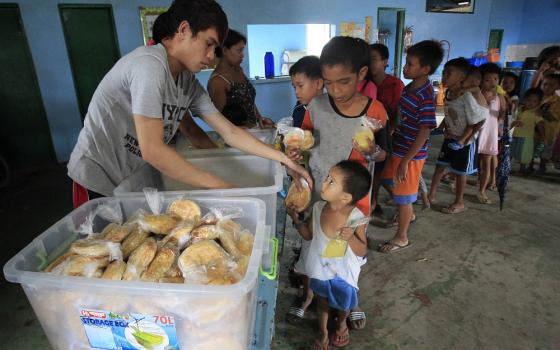When I moved into Holy Family Catholic Worker House some years ago, I was surprised to learn how many people had no consistent source of income. The economic system wasn’t really working for them. And with a certain built-in unemployment rate, it seemed to be designed that way. I considered myself to be pretty aware of things, but it wasn’t until I encountered the guests who came to supper and my legal aid clients that I began to gain new insights and perspectives into how systems operate. Time and time again I could see that the experiences of those most affected are often discounted and ignored. People at the margins have been left out, left behind. Have become invisible.
Pope Francis speaks about this dynamic of exclusion in “Joy of the Gospel”:
We have created a ‘throw away’ culture which is now spreading. It is no longer simply about exploitation and oppression, but something new. Exclusion ultimately has to do with what it means to be a part of the society in which we live; those excluded are no longer society’s underside or its fringes or its disenfranchised – they are no longer even a part of it. The excluded are not the ‘exploited’ but the outcast, the ‘leftovers.’ (53)
I am heartbroken by so much of what is going on in the world right now. As I watch the mainstream media coverage of these events, it becomes painfully clear to me that this dynamic of exclusion is at play. Too often the experience of those most affected is ignored, in the media coverage and in efforts to address the situations. Does this end up making their lives expendable?
Many of these situations probably seem to us to be intractable. There doesn’t appear to be any way out or forward, only spinning around in the cycles of violence.
I find myself wondering what would happen if we started focusing our attention on those most affected and really listened to their experience, honoring it for what it is. Learning from it and from their insights. What if that would become the starting point for individuals, groups, governments, nations and the global community? How would it affect the structures and systems we create? Why not look at this as the starting place for providing a way out, a way forward together?
What if in the cycle of violence in Gaza/Israel, attention is focused on the people of Gaza who seem to be bearing the brunt of it? What if we paid attention to what they are experiencing now and what they have been experiencing prior to the latest rounds of bombing?
What if we really focused our attention on the children and families fleeing their countries, listened to and learned from their experiences? What if the president and elected representatives of the U.S. did this? What if the leaders of other countries did this? How would this shape their decisions?
What if the bishops in preparing for the Synod on the Family, focused attention on the experience of families in all their diversity trying to live faithfully?
What if those making decisions in the church really focused attention on, listened to and honored the experience of women, gay, lesbian and transgendered people, the laity?
What if all of us facing climate change, focused our attention on Earth and really listened? How would it change our way our policies, practices and way of living?
In our own way, we at Global Sisters Report are about shifting attention. We are trying to focus our attention on those most affected and on what is being created by women religious and others serving among them.
Each one of us can choose where and how to focus our attention. We can choose to shift it toward those who have been excluded.
For some of us, we’ll have to place ourselves in different circumstances in order to be attentive. I had to place myself in the presence of the guests at the Catholic Worker House to hear their experience and learn about the economic system. We’ll have to spend the time to search out alternative sources of media and information. We’ll have to listen carefully.
“ . . . what the Holy Spirit mobilizes is not an unruly activism, but above all an attentiveness which considers the other ‘in a certain sense as one with ourselves.” (Joy of the Gospel)
There is a power in attentiveness. Like the yeast the woman mixed into the flour.
[Jan Cebula, OSF, is liaison to women religious in the United States for Global Sisters Report.]
